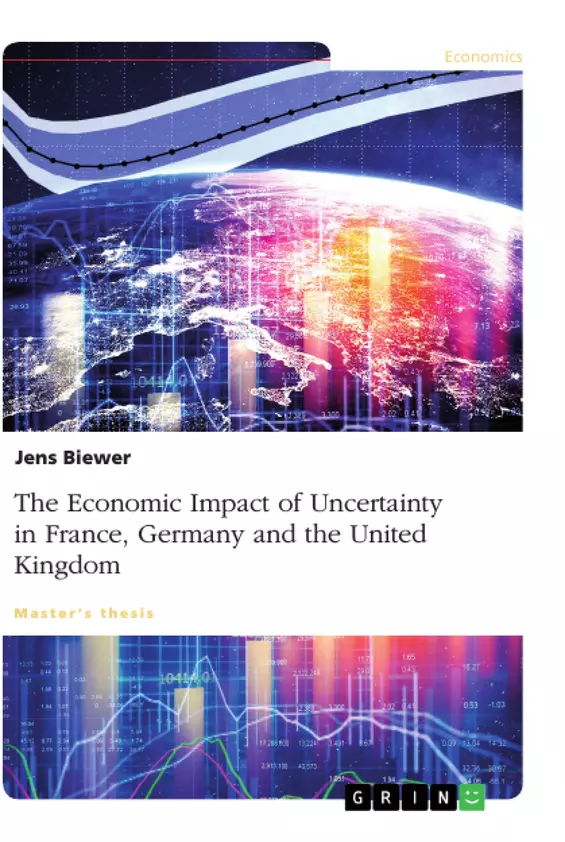This work deals with the economic impact of uncertainty on macroeconomically important variables in three countries: France, Germany and the United Kingdom. First, the econometric bases are derived, starting with a univariate case. With the introduction of the vector autoregressive model, time series of variables are included, which all depend on and influence each other. Subsequently, the individual preparations, such as Cholesky decomposition, are made to derive the innovations that flow into the system.
After the data and variables to be considered for the model have been described in detail, stationarity tests must be carried out to enable consistent estimates to be made later. For this it is necessary to perform additional transformations. Finally, the VAR model is estimated and the results can be visualized and interpreted. It is shown that short-term shocks in uncertainty have different impacts on the variables under consideration. In addition, country-specific responses can be identified in the course of the Impulse Response Functions, differing in terms of amplitude, direction, behavior and persistence. With the help of Forecast Error Variance Decompositions, interdependencies between variables can be identified and possibly put into a logical, functional context.
Inhaltsverzeichnis (Table of Contents)
- Abstract
- List of Figures
- List of Tables
- List of Acronyms
- 1 Introduction
- 2 Econometric Methodology
- 2.1 Autoregressive Model
- 2.2 Vector Autoregressive Model
- 2.2.1 Partial Autocorrelation Function
- 2.2.2 Information Criteria
- 2.3 Granger Causality
- 2.4 Cholesky Decomposition
- 2.5 Impulse Response Function
- 2.6 Forecast Error Variance Decomposition
- 3 Data and Indices
- 3.1 Uncertainty Index
- 3.2 Industrial Production
- 3.3 Harmonised Index of Consumer Prices
- 3.4 Interest and Shadow Rates
- 3.5 Preparation of Data and (Back-) Testing
- 3.5.1 Adjustment of the Global Uncertainty Index
- 3.5.2 Augmented-Dickey-Fuller-Test
- 4 Empirical Results
- 4.1 Model Setup
- 4.1.1 Lag Length Selection
- 4.1.2 Ljung-Box-Test
- 4.2 Impulse Response Functions
- 4.2.1 France
- 4.2.2 Germany
- 4.2.3 United Kingdom
- 4.3 Forecast Error Variance Decompositions
- 4.3.1 France
- 4.3.2 Germany
- 4.3.3 United Kingdom
- 4.1 Model Setup
Zielsetzung und Themenschwerpunkte (Objectives and Key Themes)
This master's thesis analyzes the impact of uncertainty on important macroeconomic variables in France, Germany, and the United Kingdom. The research aims to examine the short-term effects of uncertainty shocks on these variables, particularly focusing on the variations in response across the three countries. The study explores the interdependencies between these variables through the lens of Forecast Error Variance Decompositions, offering insights into their interconnectedness.
- The economic impact of uncertainty on key macroeconomic variables
- Country-specific responses to uncertainty shocks
- Interdependencies between macroeconomic variables through Forecast Error Variance Decompositions
- Application of econometric models, such as Vector Autoregressive (VAR) models, to analyze time series data
- Comparison of the effects of uncertainty on the economies of France, Germany, and the United Kingdom
Zusammenfassung der Kapitel (Chapter Summaries)
- Chapter 1: Introduction This chapter sets the stage for the thesis, outlining the research question and the significance of analyzing the economic impact of uncertainty. It provides context by highlighting the importance of understanding uncertainty's role in macroeconomic variables, particularly in a globalized world.
- Chapter 2: Econometric Methodology This chapter delves into the theoretical foundation of the econometric methods employed in the thesis. It explains the concept of autoregressive models, their application in analyzing time series data, and the rationale behind using Vector Autoregressive (VAR) models to capture the interdependencies between multiple variables.
- Chapter 3: Data and Indices This chapter focuses on the data sources and indices utilized in the study. It presents a detailed description of the uncertainty index used, along with the macroeconomic variables considered, such as industrial production, consumer prices, and interest rates. The chapter concludes with a discussion of the data preparation and testing procedures, including stationarity tests to ensure consistent estimates.
- Chapter 4: Empirical Results This chapter presents the empirical findings of the study. It demonstrates the application of the VAR model and analyzes the impulse response functions to identify the impact of uncertainty shocks on the chosen macroeconomic variables. The chapter also presents the results of the Forecast Error Variance Decompositions, highlighting the interdependencies between these variables.
Schlüsselwörter (Keywords)
The key themes and concepts explored in this work encompass the economic impact of uncertainty, econometric modeling, Vector Autoregressive (VAR) models, macroeconomic variables, impulse response functions, Forecast Error Variance Decompositions, and comparative analysis of France, Germany, and the United Kingdom.
Frequently Asked Questions
What is the main objective of this study on economic uncertainty?
The thesis analyzes how short-term shocks in uncertainty impact key macroeconomic variables in France, Germany, and the United Kingdom using VAR models.
Which macroeconomic variables are considered in the model?
The study focuses on Industrial Production, the Harmonised Index of Consumer Prices (HICP), and Interest or Shadow Rates.
What are "Impulse Response Functions" in this context?
They are used to visualize and interpret how a variable (like industrial production) reacts over time to a specific shock in uncertainty.
Do France, Germany, and the UK respond similarly to uncertainty?
No, the study identifies country-specific responses that differ in terms of amplitude, direction, behavior, and persistence.
What is the purpose of "Forecast Error Variance Decompositions"?
They help identify interdependencies between variables and determine how much of the variation in one variable can be explained by shocks in another.
- Citar trabajo
- Jens Biewer (Autor), 2020, The Economic Impact of Uncertainty on France, Germany and the United Kingdom, Múnich, GRIN Verlag, https://www.grin.com/document/538403



